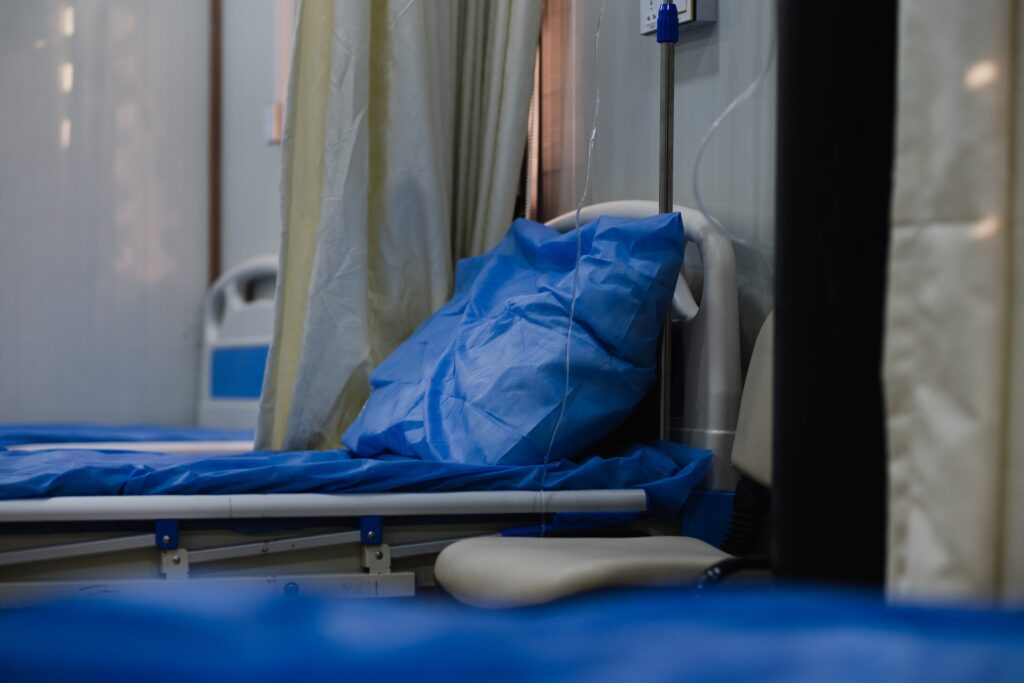Hospital Bedsores: When to Seek Legal Help for Your Loved Ones

Hospital Bedsores: When to Seek Legal Help for Your Loved Ones
Hospital bedsores most commonly develop after improper care and attention in a medical facility. Insufficient staffing and training are common culprits behind sores developing. If you see bedsores on a loved one in a care facility, it may be a sign of medical negligence, which demands your attention. Failure to act can further endanger the patient.
Medical negligence is a serious crime that can cause lasting physical and emotional injury to those involved. We recommend speaking to an attorney as soon as you suspect it happening, such as when bedsores first appear. Our personal injury attorneys have experience handling these cases and can help you navigate the insurance and court systems so you get the outcome you deserve.
Understanding Hospital Bedsores
Hospital bedsores are a type of pressure sore that is common in medical facilities. They frequently develop when a patient does not receive proper attention and care. There are four main stages of development, but only the first one is easily treatable.
- Stage one bedsores are generally patches of thin red skin with altered sensation.
- Stage two sores develop sores that go through the first layer of skin.
- Stage three bedsores involve more tissue. They are easily infected and very difficult to treat.
- Stage four sores reach into supportive tissue, such as bone and tendons. They are extremely painful and difficult to treat. Stage four bedsores can lead to infection, amputation, and death.
Advanced-stage bedsores are a serious threat to health. Nursing homes in Florida must transfer a patient with stage three or four pressure ulcers to a medical facility capable of treating them.
How Bedsores Form
As their name implies, pressure sores form when areas of thin skin are left under pressure for prolonged periods. Failure to reposition a patient, improper skin care, and failure to monitor skin condition are major contributors to their development.
Many people remain in bed for extended periods without developing pressure sores. However, they are more common in patients who are underweight or unable to reposition themselves freely. They typically occur on parts of the body where thin skin covers bony surfaces, such as the hips, shoulder blades, and ankles.
Preventative Strategies
Since pressure sores happen when a person remains in the same position for long periods, the best prevention is repositioning. Monitoring patient skin for red spots or patches of skin that are warmer than other areas is also important.
Proper skin care and application of moisturizing lotions may help reduce skin damage. If a patient has compromised circulation or sensation in an area, special bandages designed to reduce friction may also help preserve the skin.
Using special mattresses or pillows can reduce pressure on specific areas and help prevent sores from developing or stop early-stage ones from getting worse. This equipment should be provided for patients most at risk of developing sores.
Patients Most at Risk
Sadly, the patients most at risk of bedsores from negligent care are the same ones who rely the most on that care for survival. Patients with diabetes, those who are unable to move on their own, and individuals with compromised circulation are most likely to develop bedsores. Malnutrition is another key contributor to the condition.
What To Do If a Loved One Develops Bedsores
Developing bedsores alone does not necessarily mean your loved one is a victim of neglect. Sometimes, they develop despite the best intentions and care of a well-trained staff. However, it is a sign that they may not be receiving the level of care required to maintain their physical health. Since Florida law mandates that nursing facilities implement proper staff training programs to reduce the incidence of serious sores among patients, the facility is ultimately responsible.
If your loved one has developed bedsores while in a hospital or skilled nursing facility, you should take steps to prevent it from happening again. The very first thing you need to do is to ensure that your loved one is receiving adequate care. Spend time either in person or on the phone and ask questions. Ask questions about their comfort level, how often staff checks in, how often clothing and linens are changed, and if the food is adequate.
If you can visit in person, take note of how clean and cared for your family member is. His hair should be combed, clothes clean, and bed linens unsoiled. Report any concerns to a manager if necessary.
Consult an Attorney
Once you are assured your loved one is safe, it is often a good idea to speak with an accident attorney. This does not mean you are filing a lawsuit, but rather that you are laying the groundwork for any insurance claims or legal proceedings that may arise from the bedsores. Be prepared to provide the attorney with evidence of the bedsores and any other signs of neglect you have noticed. This could be pictures, medical charts, or other forms of records.
In some situations, speaking to a facility manager or the nurse supervisor is enough to improve care levels. Either you or your attorney can have this conversation. Providing supporting documentation for your claims is helpful to show you are serious about the care your loved one receives and that steps be implemented to improve it.
Sadly, the situation can quickly escalate and you may find that nothing happens despite complaints and repeated conversations with managers. Because the health and safety of your family member is at stake, you may need to take additional steps, including legal action against the facility.
Hold the Facility Responsible
Failing to see the complaint all the way through can cause complacency in the staff and administration of the facility in question. Therefore, you may need to pursue legal action if they fail to improve despite complaints from you and an attorney.
Having an attorney on your side throughout this process makes it easier to take this important next step. We’ll advise you of the next steps and what is involved with them so you can get justice for your loved one and the compensation he deserves.
Your actions may have far-reaching effects beyond improved care for your loved one. Lawsuits draw attention to a care facility, whether it is a hospital or a skilled nursing home. In many cases, an investigation into neglect claims leads to widespread changes in operations and care standards.
As you can see, having an attorney on your side is helpful from the earliest stages of this process. Therefore, we recommend scheduling a free case evaluation as soon as you suspect negligence. You can receive an impartial opinion about the situation and review potential next steps to ensure your loved one receives the care he deserves.
The Help You Need To Ensure Proper Care
Personal injury lawyers can help you recover damages related to improper care. Legal action can also help improve the conditions in hospitals and nursing facilities so patients receive proper care. If your loved one has suffered neglect in a skilled care facility, contact Gordon & Partners. Our experienced attorneys have more than 200 combined years of experience litigating injury cases, and we will use that experience to fight for you and your loved ones.
Schedule a free, no-obligation case review to get an impartial evaluation of your situation. Contact us today at (855) 722-2552 to schedule a confidential in-office consultation at one of our convenient South Florida locations or contact us for a simple online case review form.
Free Case Evaluation
Verdicts & Settlements
Jury verdict for the wrongful death of a 63-year-old man survived by his widow.
Jury verdict for the wrongful death of a 97-year-old woman at an ALF.
Recovery for family of infant killed during bath at babysitter’s home.
Related News
- Common Signs of Nursing Home Abuse You Need to Know
- What is Nursing Home Abuse and Neglect – and How Do They Differ?
- Preventing Bedsores: How Patients and Families Can Advocate for Better Care
- Frequently Asked Questions About Bedsores Lawsuits
- Choosing the Right Bedsores Lawyer: Factors to Consider
- Statute of Limitations for Bedsores Lawsuits: Don’t Miss Your Chance for Justice




 – Client Reviews
– Client Reviews